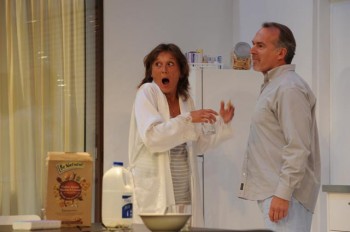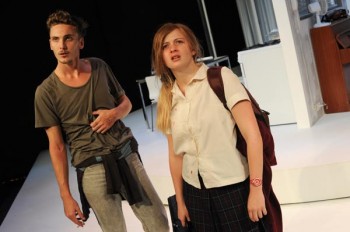Babyteeth – a love story about death

It’s almost any kind of family morning in Sydney. Anna fusses over her husband’s breakfast. Henry is concerned about getting to work on time. Their daughter’s boyfriend has to be reminded not to smoke in the house. It’s business as usual, except in the next room, fourteen year old Milla just died of cancer.
Babyteeth, making its debut at Belvoir St’s Upstairs Theatre, tells the story of the first and last romance of Milla’s life, but it also tells the story of a family that is unravelling, and trying not to; that is maybe in a little bit of denial about its state of free-fall. It’s a love story between Milla and Moses, but it’s also a love story to family and to life as much as it is anything else.
Perhaps most commanding on stage is Helen Buday as Anna, who is wildly comic and desperately tragic as a tightly-wound mother who is losing her grip on composure as rapidly as she is losing her child. Greg Stone’s father and husband Henry appears to be the calmest member of the family but he is touchingly human in his fatherly concern for young pregnant neighbour Toby (Kathryn Beck). His attachment to her is almost visceral and it’s Milla, in her youthful observance, that tries to bring them closer together.
And then there’s Moses, the older, drug addicted, and freshly evicted twenty-five year old who becomes Milla’s love interest, confidant, and even protector; Eamon Farran brings a rich nuance to a character grounded in roughness.

However, it’s Sara West’s Milla who carries with her a sort of ageless wisdom trapped within her youth. Vulernable and defiant, Milla carries this story as a protagonist in her own right but also as catalyst for those around her, and West carries these duties effortlessly; Milla is luminous in her grip on life.
Robert Cousins’ set design, most rewarding in the final scene of the first act – a revolving stage of three different sets – is excellent in execution and almost devastating in its normalcy; much of its action takes place in a kitchen. It could be any kitchen. This could be any family in the country. It is many families in the country, those that are touched by critical illness and yet have to live in a world that keeps turning. Milla’s Latvian violin tutor Gidon (Russell Dykstra, in a standout performance) passionately exclaims to Anna the injustice of a constantly moving world in the face of personal trauma, which makes the revolutions of the set all the more poetic.
Directed by Eamon Flack, this play feels as though it is in constant motion towards the end – Milla dead from cancer – but it celebrates the journey; the play is bursting with life instead of laced with the dread of death.
New Australian playwright Rita Kalnejais wanted to write a romantic comedy about death. It’s more than that. It’s a love letter to life – to love – to death, all in turns; it’s a play that finds grace somewhere in between grief and the joy of life.

